Pharrell Williams on his vision for Louis Vuitton and the black legacy he inherited from Virgil Abloh
Sign up now: Get ST's newsletters delivered to your inbox
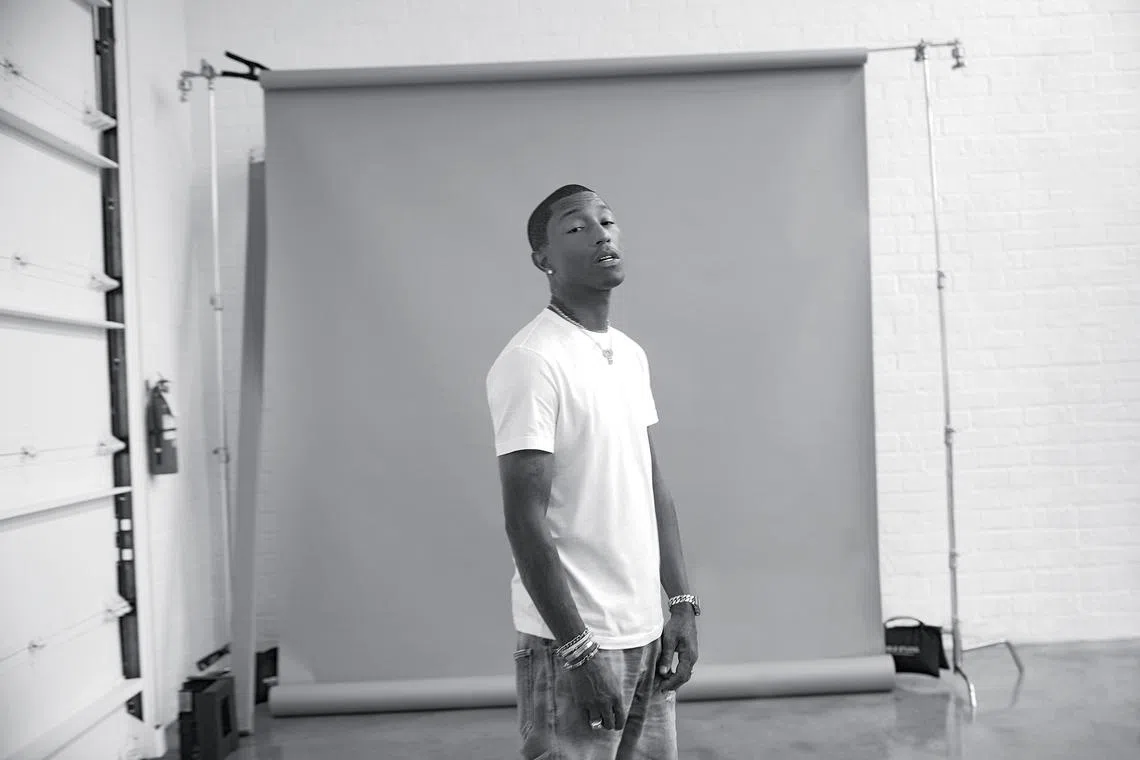
Pharrell Williams made a spectacular debut with his collection for Louis Vuitton in June.
PHOTO: COURTESY OF LOUIS VUITTON
Jeffrey Yan
Follow topic:
This article first appeared in Harper’s Bazaar Singapore, the leading fashion glossy on the best of style, beauty, design, travel and the arts. Go to harpersbazaar.com.sg @harpersbazaarsg harpersbazaarsingapore
It seemed like an impossible task. The biggest luxury fashion brand in the world, whose menswear division for the past few years had been a cultural hot rod when it was spearheaded by visionary disruptor Virgil Abloh, needed someone new in the driver’s seat.
In his time at Louis Vuitton, Abloh broke down countless barriers and redefined what luxury looked like.
Along the way, he made space for people who had never been given a seat at the table. How do you fill shoes as gargantuan as his?
The position of Men’s creative director was left vacant for almost two years after Abloh’s death in November 2021, while the French fashion house considered names from every corner of the industry.
In the end – and in the spirit of Abloh – Louis Vuitton went with a left-field choice in Pharrell Williams,
When Williams’ appointment was announced in February, it sparked off an intense debate about traditional training versus cultural credentials. The designer silenced naysayers with a spectacular debut in June.
Part fashion show and part pop culture, Event (yes, with a capital E) was attended by the likes of music celebrity couples Rihanna and A$AP Rocky, and Beyonce and Jay-Z, along with a roll call of some of the biggest movers and shakers of today. Rihanna is also the face of Williams’ debut Louis Vuitton campaign.
Shown on the iconic Pont Neuf, the oldest bridge in Paris, France, Williams’ first collection for the fashion house remixed long-established signatures such as the Damier check – given a pixelated, camouflage makeover – and the Speedy bag, turned out in pop brights and every size imaginable.
In this exclusive Q&A, the designer and musician talks about his vision for Louis Vuitton, and the black legacy he inherited and is now carrying forward.
How did you approach your first collection for Louis Vuitton?
In moments like this, when you have been chosen to do something, the sun is shining on you. The quintessential question that I ask myself all the time, and people I care about, is: “Hey, if the sun is shining on you, what would you do with the light?”
When the sun shone on me for an opportunity like this, it changed my life. If I’m going to get this appointment, I’m going to use it to do two things: one, to share all my learning as a perpetual student; and two, to share my love and appreciation.
I’m choosing to shine a light back on this city, these people, all my friends here, who have kept me lifted all this time.
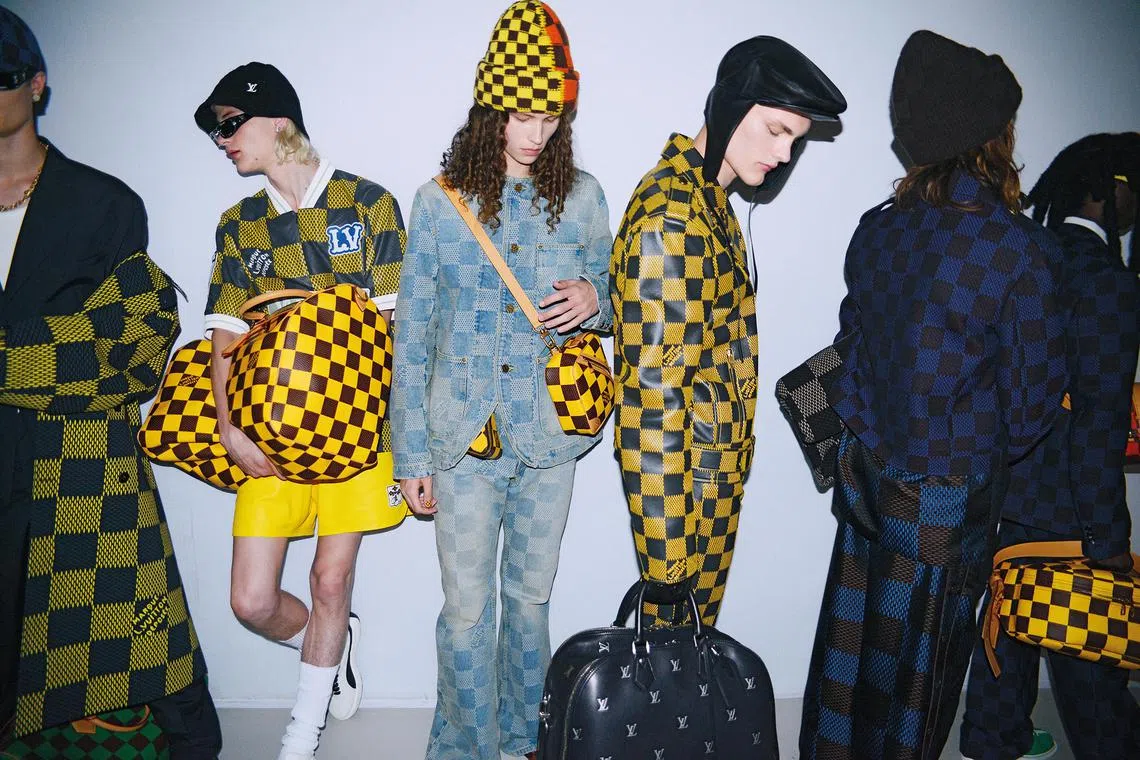
Louis Vuitton Men’s Spring-Summer 2024.
PHOTO: COURTESY OF LOUIS VUITTON
What is the premise of the collection?
For me, LV means LVERS. If you appreciate Louis Vuitton, you are a lover of the curation. You love the product, but deeper than that, its a love for the culture that embodies a like-mindedness of taste.
The humans who wear Louis Vuitton have five modes: dandy, which is tailoring for business and events; comfort, which is what you wear at home and to the petrol station; resort, for the beach; sport, for activity and working out; and finally, the core staples of LV, which I am going to iterate on every season.
It is thinking across the board of the demographic. Everything you want to do, we made something for you.
Why did you focus on the Damier pattern?
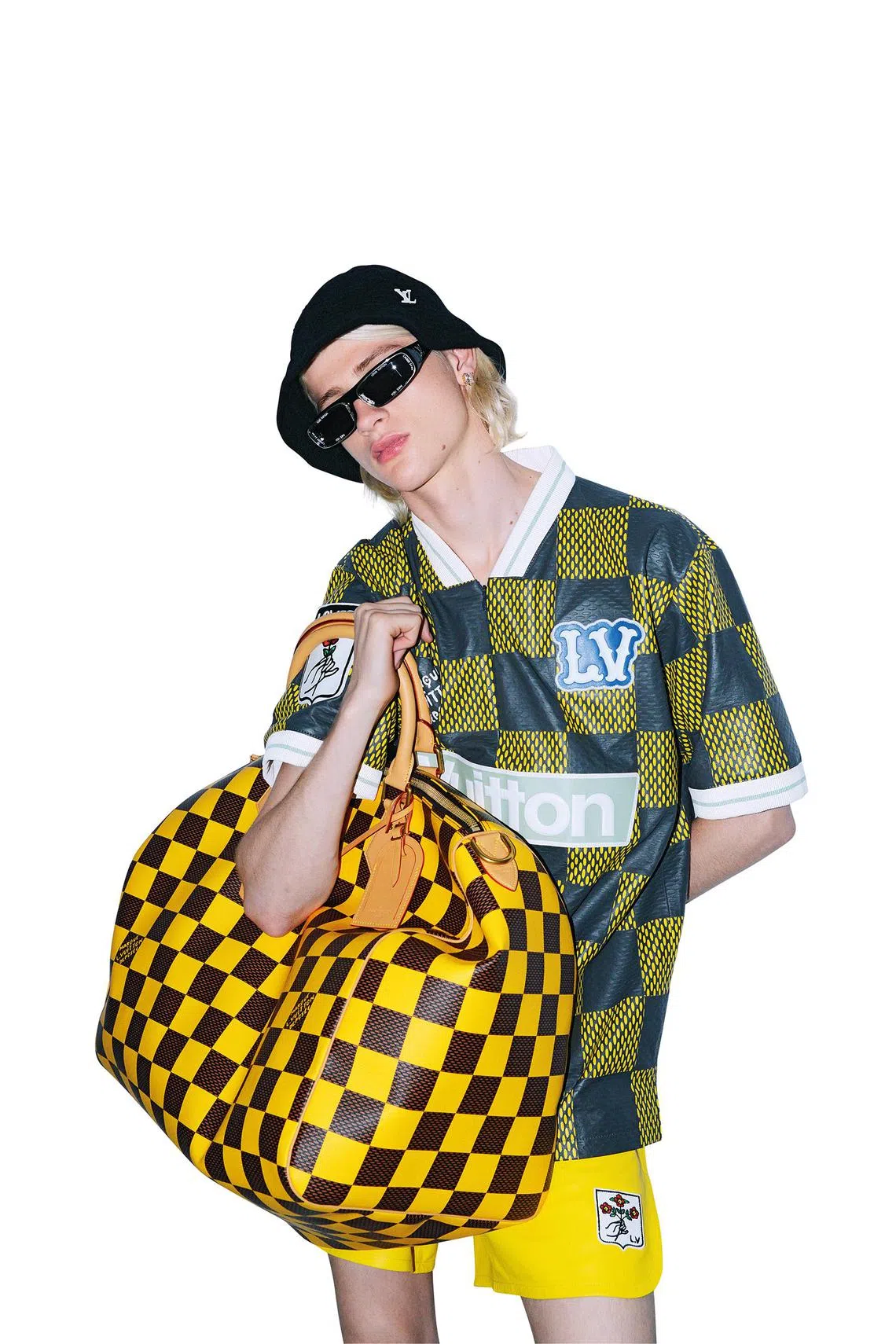
HBPHARRELL31 - LOUIS VUITTON MEN’S SPRING-SUMMER 2024 BACKSTAGE 45 Credit: Courtesy of Louis Vuitton
PHOTO: COURTESY OF LOUIS VUITTON
I came into this wanting to make some indelible marks, the first of which was: I know the monogram is historically a very dominant force within the House. I have the Bastille bag in Damier, I have shoes and boots in Damier.
I saw it as an opportunity. The fact that it has the chessboard set-up – we could use the grid as a platform to play with different artistic techniques.
The first was to treat the blocks like eight-bit Atari graphics. I worked with (pixel artist) ET Artist, who is really good at it. The super powerful one is the Damoflage, which fuses Damier and camo. I wanted to make a print that makes people say, “Okay, that’s P. And that’s Damier.
Why reimagine the Speedy bag for your first campaign?
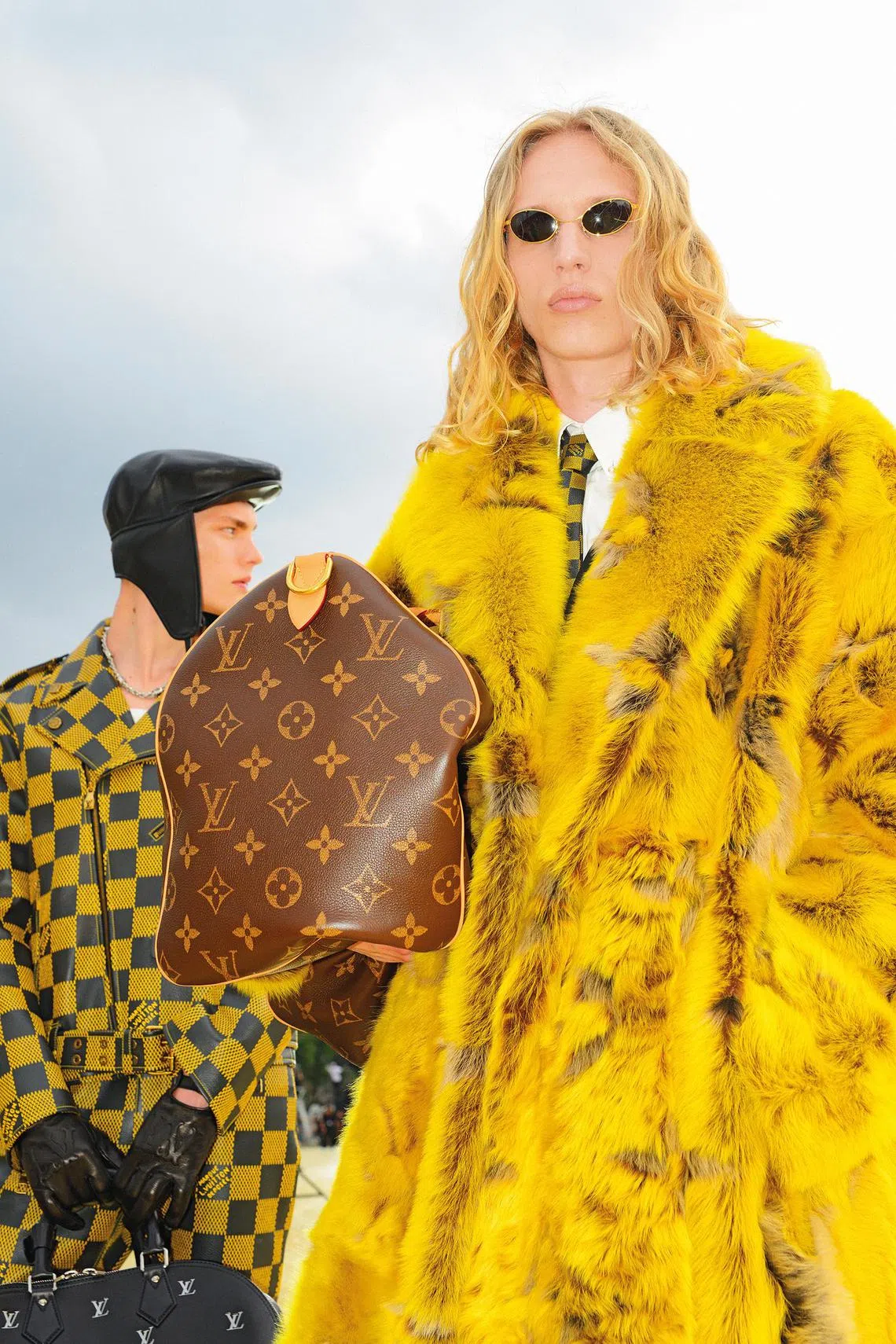
HBPHARRELL31 - LOUIS VUITTON MEN’S SPRING-SUMMER 2024 BACKSTAGE 28 Credit: Courtesy of Louis Vuitton
PHOTO: COURTESY OF LOUIS VUITTON
It was always a men’s canvas bag until they made a smaller version for Audrey Hepburn in 1965. I wanted to take something I felt would be unisex and just make a great bag for humans. It is an everyday icon conceived for every walk of life.
It is inspired by Canal Street in New York. It is flipping it on its head. I want to come in on a bag level and make a splash. Primary colours are where you start. Then you see the bag has wrinkles in it and that it is droopy, and you know instantly that it is not a regular Speedy. That is not canvas. It is butter-soft leather.
How has your personal relationship with Louis Vuitton evolved over the years?
I was introduced to Louis Vuitton through rappers and the aftermarket clothing by Dapper Dan in Harlem. You would see rag-tops on cars made out of Louis Vuitton bag materials. We were blown away by that. I never thought I would be able to afford it. I did not even know if I was necessarily interested in it because it was just so next level.
I started working in music and, as things evolved, I met American fashion designer Marc Jacobs. In 2004, he asked Japanese fashion designer-record producer Nigo and me to collaborate on the Millionaire sunglasses.
In 2008, Pietro Beccari, who was at Louis Vuitton at the time, asked me to design a jewellery collection for the luxury house.
My first foray into fashion was because of Marc’s generosity, and it only grew from my relationship with Pietro. Over the years, we stayed in touch. When he offered me the job as Men’s creative director, I was excited, not only for the job, but also to work with him again.
In your show notes, you pay tribute to “the giant before me”. Can you tell us a little more about that?
Virgil has always been a brother in spirit. Now, that is literally what we work with here. He left a lot of hits with the luxury house. As far as I am concerned, I am collaborating with his spirit.
When he got this appointment, I was really happy for him. Right until he started here, we were working together on Joopiter, an online auction space we had.
It was crazy what the connections were and the respect he had for us, and which we continue to have for him. I can tell you that Virgil and I being here has to say to kids who look like us, “Oh, I can do anything. I can be anything.”
What does your appointment at Louis Vuitton mean to you?
When you come from a culture that has been purposefully blocked and set in disadvantaged situations, you cannot imagine what is even possible. But there is this narrative that is changing. So many of us are being swept up from one place and landing in fertile soil in other places, and being treated and watered and sunned like all souls should be.
I can say there is an impact in that way, which is changing. It is not enough, but it is happening. I am very honoured to be a part of that.
When I say the sun is shining on me – and it is shining on all of us – I am saying, “Listen, this is a French house, but they went right back to America and found another black man, and gave me the keys.”
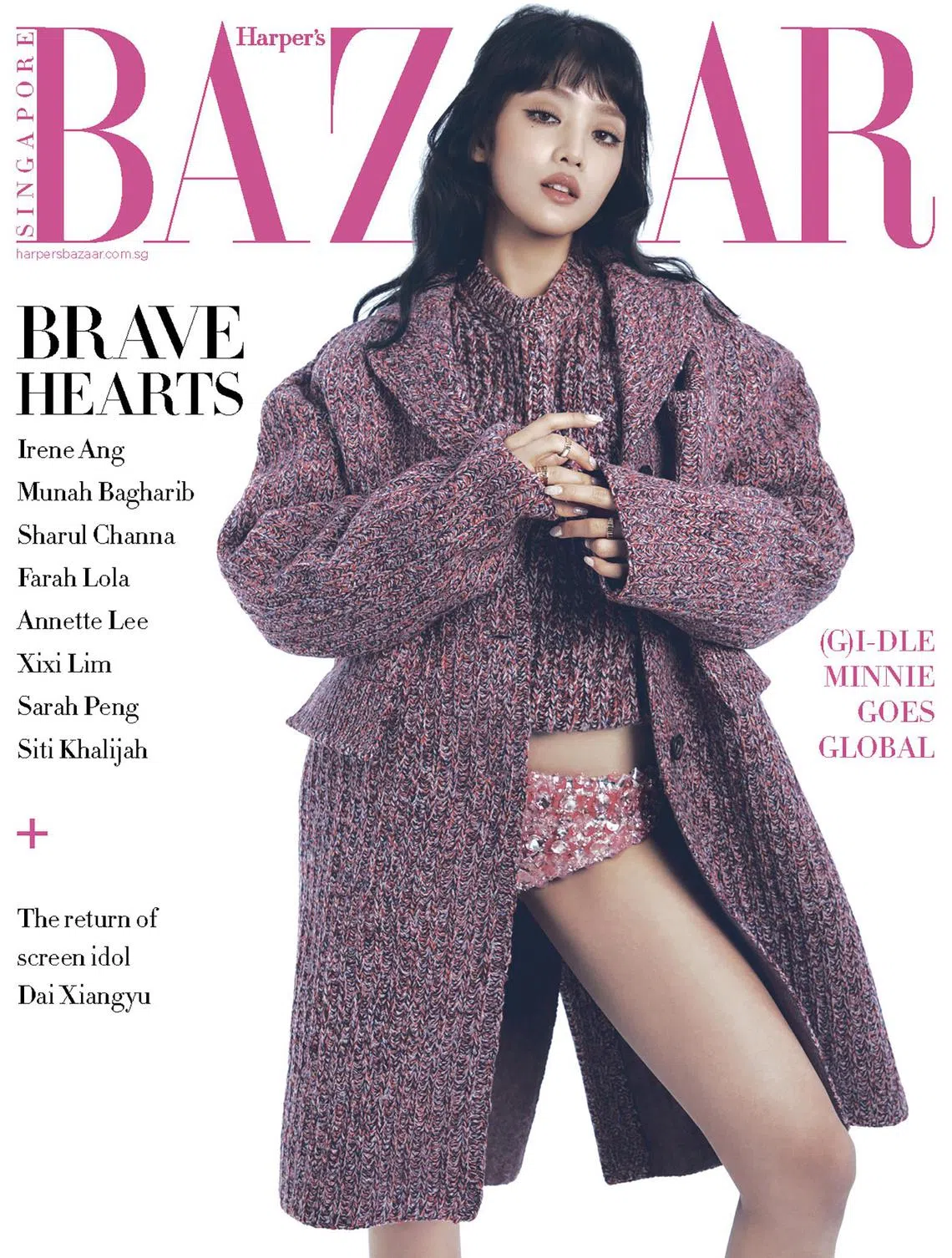
hbbody - Harper's Bazaar Singapore August 2023 magazine cover Credit: Harper's Bazaar Singapore

